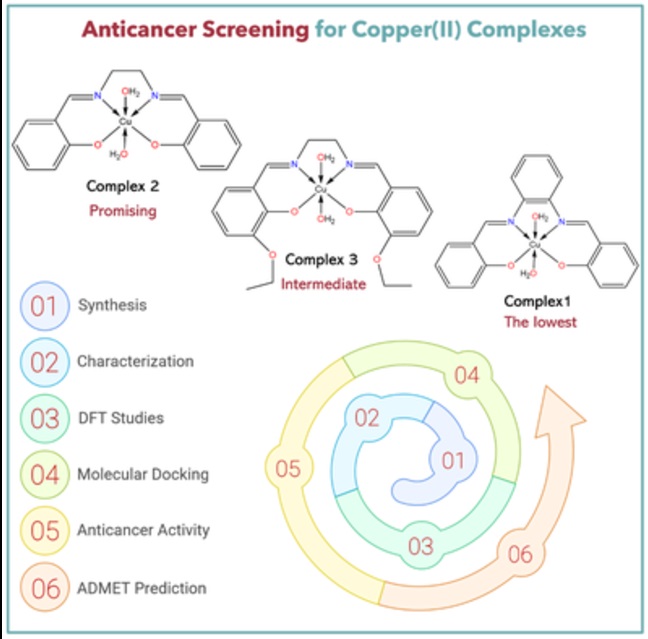Cancer treatments using metal-based drugs like cisplatin are effective but often come with serious side effects and limited selectivity for cancer cells. This study explores whether specially designed copper-based compounds can offer a safer and more targeted alternative.
The research was conducted by Yoji Kobayashi, King Abdullah University of Science and Technology (KAUST), Thuwal, Saudi Arabia, Mostafa A. Hussien, King Abdulaziz University (KAU), Jeddah, Saudi Arabia, and colleagues. The study found that one copper complex, [Cu(salen)(H₂O)₂] (called Complex 2), showed promising anticancer activity, especially against colon cancer cells, with lower toxicity to healthy cells compared to cisplatin.
The researchers created and tested three copper(II) complexes using three different ligands, including salophen, salen, and etho-salen. Each ligand was reacted with copper(II) acetate in ethanol to form the final complexes. Water molecules were added to complete the structure, giving each complex an octahedral shape. The structures were confirmed using spectroscopy and computational modeling (DFT). The geometry and bonding were consistent with stable copper-ligand coordination. The anti-cancer property of complexes was tested in cancer cells, i.e., MCF-7 breast and HCT-116 colon (in vitro study). It has been observed that the Cu(II) complex with salen ligand, i.e., “Complex 2,” had the strongest effect on cancer cells, especially colon cancer, and was less harmful to normal cells (HFF-1 fibroblasts). Computer simulations (molecular docking) showed that “Complex 2” fits well into the active sites of two cancer-related proteins (Cdk5 and aromatase), suggesting it could block their function.
This research highlights “Complex 2” as a potential lead compound for developing safer, more selective metal-based cancer drugs. While it’s not as powerful as cisplatin yet, its lower toxicity to healthy cells makes it a promising candidate for further development. Future work could involve in vivo testing and refining the compound to improve its potency and safety.
- Salen-Type Copper(II) Complexes: Synthesis, Characterization, Computational Studies, Molecular Docking, Anticancer Potential, and Pharmacokinetic Prediction
Abdellatif A. Helaly, Bandar A. Babgi, Yoji Kobayashi, Rohit K. Rai, Ehab M. M. Ali, Abdulaziz A. Kalantan, Walid M. I. Hassan, Mostafa A. Hussien, Muhammad M. I. Ismail
ChemistryOpen 2025
https://doi.org/10.1002/open.202500061




